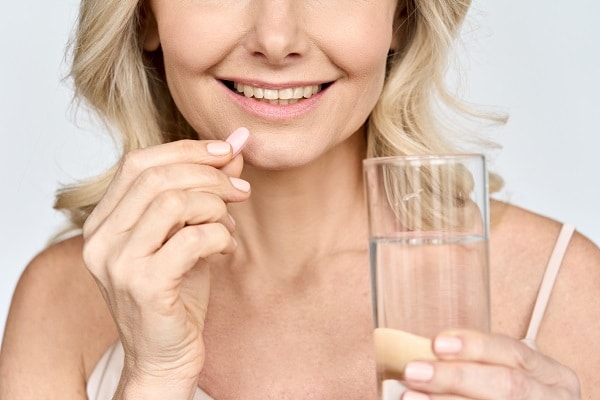As you age, your body changes and your needs for specific vitamins change as well. This is especially true if you are experiencing any of the following symptoms: feeling more tired than usual, having a hard time paying attention or remembering things, having trouble walking or climbing stairs. If this sounds familiar to you, then you must talk with your doctor about which vitamins might be right for you and how much of them you should take each day. The best way to get these essential nutrients is through food. However, sometimes it takes dietary supplements to reach the recommended daily allowance (RDA) for some people.
Contents
Vitamin D

The recommended intake for men aged 50 to 70 is 15 mcg (600 IU) each day, but do not take more than 100 mcg (4,000 IU) at once. You need at least 20 mcg (800 IU) a day if you are over the age of 70, but not more than 100 mcg (4,000 IU).
For women aged 50 to 70, 15 mcg (600 IU) each day is best, but do not take more than 100 mcg (4,000 IU) a day. If you are age 70 or older, you should consume at least 20 micrograms (800 IU) per day but no more than 100 micrograms (4,000 IU). Foods you can get vitamin D from include: milk, yogurt, cheese, mushrooms, eggs, and fish.
Calcium

You’ll need 1,000 mg each day for men aged 50 to 70. The recommended daily intake for men aged 70 and up is 1,200 mg, and for women aged 70 and over, 1,200 mg per day. Take no more than 2,000 mg per day. Foods you can get calcium from include milk and milk products such as yogurt and cheese and green vegetables such as broccoli and kale.
Vitamin C

Men aged 50 to 70 should have 90 mg per day, although no more than 2 grams a day. Women aged 50 to 70 need 75 mg each day, but only up to 80 mg. If you are over the age of 70, at least 90 mg is recommended with a maximum of 3 grams a day.
For women who are 70 and up, at least 75 mg is best. Do not take more than 80 mg a day. Foods you can get Vitamin C from include: sweet peppers, citrus fruits, and tomatoes.
Vitamin B12

For men between the ages of 50 to 70, 2.4 mcg per day is best. And for men over the age of 70, a maximum of 2.8 mcg per day. Women aged 50 to 70 should have 2.2 mcg each day, and those over 70 should consume no more than 2.4 mcg each day. You can find vitamin B12 in these foods: shellfish, beef liver, salmon, whole eggs, and milk.
Vitamin E

For those men that are aged 50 to 70, 15 milligrams each day is best. For those over the age of 70, you need at least 22 mg. Women ages 50 to 70 should have 15 mg each day, and women who are 70 or older require the same amount. Don’t take more than 15 mg every day. These foods contain vitamin E: sunflower seeds, almonds, hazelnuts, sunflower oil, and spinach.
Vitamin A

For men aged 50 to 70, a minimum of 750 mcg each day. For those over the age of 70, 1,000 mcg per day. No more than 3,000 mcg should be taken in a single day by anyone under or over 70 years old. For women within this age group, 900 mcg each day. For women 70 or older, 1,000 mcg should be taken daily with no more than 3,000 mcg in one day. Foods containing vitamin A include spinach, carrots, apricots, and yogurt.
Vitamin K

Men aged 50 to 70 need 80 mg of vitamin K daily, while for those who are 70 or older, no more than 120 mg in a day. For women within this age group, the recommended intake is 75 mcg per day, and for those who are 70 or older, it’s 90 micrograms each day. Don’t exceed the maximal amount of 1.0 milligrams per day for anyone between 50 to 70 years old or 1.2 mg per day for those above the age of 70. Foods containing vitamin K include dark leafy greens such as spinach and kale, brussels sprouts, broccoli, and potatoes.
Vitamin B1

For men aged 50 to 70 years old, a minimum of 1.5 mg is required each day, with no more than 2.0 mg as the maximum daily intake. For those men who are 70 or older, 1.4 mg per day is best, but no more than 2.2 mg a day. Women who are 70 years or older should have no more than 2 mg each day. You can find vitamin B1 in these foods: brewer’s yeast, beans, shellfish, chicken, and liver.
Vitamin B2

For men aged 50 to 70 years old, a minimum of 1.7 mg is required each day, with no more than 2.4 mg as the maximum daily intake. For the men that are 70 or older, 1.5 mg per day is best, but no more than 2.8 mg a day. Women within the age of 50 to 70 years old should have a minimum of 1.5 mg each day with no more than 2.4 mg as the maximum per day for women who are 70 or older. Foods containing vitamin B2 include milk, liver, whole grains, and eggs.
Vitamin B6

For men aged 50 to 70 years old, a minimum of 1.3 mg is required each day, with no more than 2.0 mg as the maximum daily intake. For those 70 or older, 1.3 mg per day is advised, but no more than 3.0 mg a day. Women whose age range includes 50 to 70 must have a minimum of 1.3 mg each day with no more than 2.2 mg as the maximum for women who are 70 or older. You can find vitamin B6 in these foods: meat, fish, poultry, vegetables, and whole grains.
Conclusion
It is essential to eat a healthy and balanced diet regularly and also to take vitamins and minerals as supplements. This will promote healthy hair growth and make your hair look shiny. Make sure to talk to a doctor to help figure out the best dosage for you.


